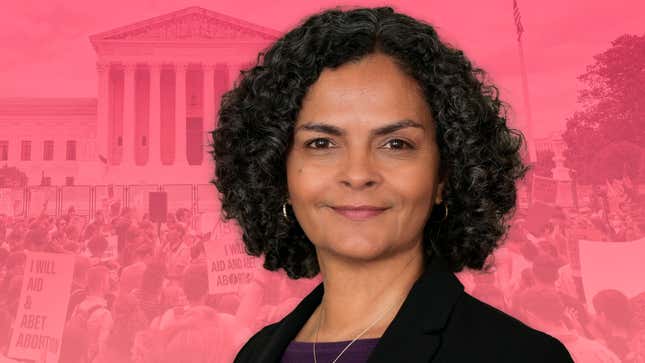Meet the Woman Helping Pregnant People Fight Hellish Legal Battles Post-Roe
Pregnancy Justice has tracked 41 cases of bogus criminal charges this year. The group's new president, Lourdes Rivera, is trying to keep people out of jail.
JusticePolitics

In two weeks, a 33-year-old woman named Kelsey Carpenter will go to court in San Diego, California, to seek the dismissal of murder and felony child abuse charges against her. Carpenter’s alleged crime is a home birth that ended in her newborn’s death after she went into labor early. She chose to give birth at home because she feared her baby would be taken from her due to her substance use. And instead of being offered addiction support services or time to grieve the loss of her baby, Carpenter now faces up to two decades in prison.
Carpenter is one of dozens of clients receiving representation from attorneys at Pregnancy Justice, a nonprofit advocacy group that’s just welcomed a new president, Lourdes Rivera, to help steer it through this muddy and volatile legal climate for reproductive rights. In a phone interview, Rivera told me about growing up in a Puerto Rican community and learning as a child about the legacy of forced sterilizations performed on women in her community. Since her upbringing in the 80s, Rivera—who led the Center for Reproductive Rights’ U.S. programs through the Trump era—fears the conditions for all pregnant people have, in some ways, only become more dangerous.
“People are facing criminal charges for laws that are not even meant to be applied to pregnancy,” Rivera said. “With the fall of Roe v. Wade and abortion bans, criminalizing the full range of pregnancy outcomes only gets easier.”
Thus far in 2023, Pregnancy Justice has worked on 30 cases involving the policing and criminalization of pregnant people—the total number of cases it worked on throughout the entirety of 2022. And Rivera tells me the organization is “busier than ever post-Dobbs,” having tracked 41 cases of pregnancy criminalization in 14 states since Roe fell last June. Over half of these cases come from Alabama, where a state “Chemical Endangerment of a Child” law meant to protect living children from home-based meth labs has been weaponized to criminalize or jail dozens of pregnant people—including one woman who smoked weed while suspected to be pregnant (though she ultimately wasn’t).
-

-

-

-

-

-

-

-

-

-

-

-

-

-

-

-

-

-

-

-

-

-

-

-

-

-

-

-

-

-

-

-

-

-

-

-

-

-

-

-








































